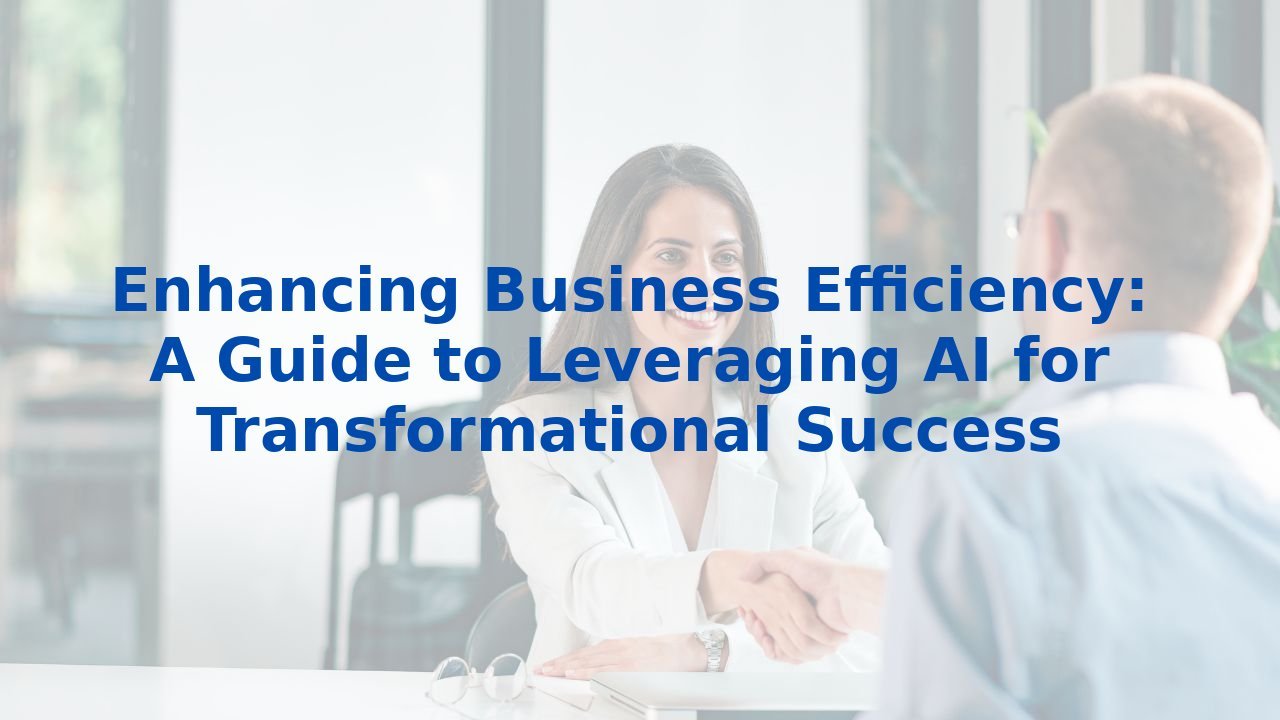Enhancing Business Efficiency: A Guide to Leveraging AI for Transformational Success
Enhancing Business Efficiency: A Guide to Leveraging AI for Transformational Success
In a world that's constantly evolving, the pressure to enhance efficiency and reduce operational friction is greater than ever. Organizations can no longer afford to operate on outdated processes or rely solely on human effort. This is where Artificial Intelligence (AI) enters the scene, offering a game-changing approach to how businesses operate. Let’s explore how AI can be harnessed to transform core business processes and drive efficiency.
Automating High-Volume Tasks and Repetitive Processes
One of the most striking advantages of AI is its capacity to automate tasks that are high in volume yet low in complexity. Think about the mundane activities like data entry, invoice processing, or even managing customer service inquiries. These tasks consume valuable time and resources, but with AI-driven automation tools, organizations can streamline processes considerably. By reducing the time and effort spent on these repetitive processes, your workforce is freed up to focus on more strategic initiatives that drive growth.
Enhancing Data Understanding and Analysis
Data is often touted as the new oil, but the reality is that unused or poorly interpreted data is like oil trapped beneath the ground. AI excels in sifting through unstructured data, extracting insights that can drive smarter decision-making. This capability is pivotal for predictive analytics, allowing organizations to anticipate market trends and potential challenges. The result? Informed decisions that align with the ever-changing landscape of business demands.
Improving Customer Engagement
The customer experience is a focal point for business success, and AI offers innovative ways to enhance engagement. Utilizing chatbots and virtual assistants can alleviate some of the burden off human customer service representatives, allowing them to tackle more complex inquiries. Furthermore, AI can analyze customer interaction data to provide insights that facilitate service improvements. By creating a responsive and personalized customer experience, companies can cultivate stronger relationships and foster loyalty, solidifying their market position.
Optimizing Decision Making
In a data-driven world, the ability to make quick and accurate decisions can mean the difference between success and failure. AI arms businesses with predictive analytics and data-driven recommendations that inform strategic choices. For instance, factors such as market trends or consumer behavior can be simulated to forecast profitability responses to various pricing strategies. This proactive approach helps businesses avoid costly blunders and ensures alignment with core objectives, paving the way for sustainable growth.
Enhancing Process Orchestration
The orchestration of processes can be intricate and prone to errors; however, AI streamlines and optimizes these workflows. By implementing AI solutions, organizations can automate intricate processes, cut down cycle times, and enhance accuracy across departments. For instance, process mapping through AI tools can uncover inefficiencies that would typically remain hidden in traditional analysis methods. The ability to refine operations continuously not only boosts productivity but also strengthens the organization’s resilience.
Facilitating Continuous Improvement
Incorporating AI isn't a one-off implementation; it sets the stage for a culture of continuous improvement. By providing real-time feedback and data-driven insights, AI fosters an environment where strategies can be recalibrated and refined incessantly. Organizations leveraging AI for ongoing refinement can keep pace with industry standards and customer expectations, ensuring long-term success. Adaptability becomes a core strength, allowing businesses to thrive amidst uncertainty.
The Benefits of Training Employees for AI
Despite the myriad advantages that AI offers, its potential remains unrealized without a well-trained workforce. Employee training in AI ensures that teams can leverage these advanced tools effectively. Understanding how to interpret AI's insights, integrate technologies into existing workflows, and troubleshoot any issues is vital for maximizing the return on investment. Training initiatives empower employees, enabling them to enhance their skill sets and adapt to the evolving landscape of technology.
Conclusion
Artificial Intelligence is not merely a trend; it is a transformative force that can enhance business processes across the board. By automating repetitive tasks, improving data analysis and customer engagement, and optimizing decision-making, AI provides organizations a powerful avenue for efficiency. Coupling this implementation with a commitment to employee training ensures that its full potential is harnessed. By embracing this synergy of technology and talent, businesses can position themselves for transformative success, ready to navigate an increasingly competitive landscape.
For organizations looking to further explore AI’s potential in transforming their operations, consider engaging with resources like Complete AI Training. By investing in robust AI training programs, businesses can equip their workforce with the skills necessary for thriving in the AI-driven future.



